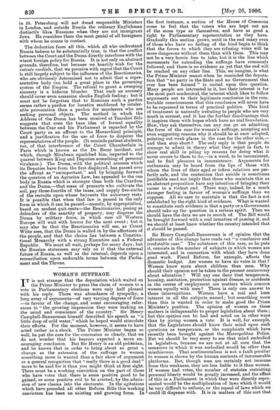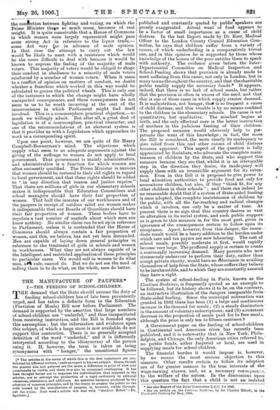WOMAN'S SUFFRAGE.
IT is not strange that the deputation which waited on the Prime Minister to press the claim of women to a vote in Parliamentary elections were only half pleased with his reply. There was abundance of sympathy, a long array of arguments—of very varying degrees of force —in favour of the change, and some encouraging refer- ences to " the growing impression they were making on the mind and conscience of the country." Sir Henry Campbell-Bannerman himself described his speech as " a little drop of cold water," which be hoped. would stimulate their efforts. For the moment, however, it seems to have acted rather as a shock. The Prime Minister began so well, he put the case for the concession so clearly, that we do not wonder that his hearers expected a more en- couraging conclusion. But Sir Henry is an old politician, and he knows that in order to bring about so great a change as the extension of the suffrage to women something more is wanted than a fair show of argument or a general recognition that " really there is a good deal " more to be said for it than you might think at first sight. There must be a working conviction on the part of those who have votes that there is some positive good to be gained, or some positive evil to be averted, by the admis- sion of new classes into the electorate. In the agitations which have preceded all other Reform Bills this working conviction has been an existing and growing force. In the first instance, a section of the House of Commons come to feel that the voters who are kept out are of the same type as themselves, and have as good a right to Parliamentary representation as they have. Gradually this section grows, until in the end many even of those who have no feeling of the kind begin to think that the forces to which they are refusing votes will be more dangerous without them than with them. This may not be a very heroic line to take, but it is the line which movements for extending the suffrage have commonly followed, and there is no evidence as yet that the end will be reached on any other line. This, we imagine, is what the Prime Minister meant when he reminded the deputa- tion that "no party in the-State and no Government that ever has been formed " is united upon this • question. Many people are interested in it, but their interest is for the most part academical, the interest which likes to follow arguments out to their legitimate conclusion in the com- fortable consciousness that this conclusion will never have to be expressed in terms of practical politics. This kind of treatment is naturally irritating to people who are very much in earnest, and it has the further disadvantage that it inspires them with hopes which have no real foundation. How, they ask themselves, can any one go on admitting the force of the case for woman's suffrage, accepting and even suggesting reasons why it should be at once adopted, pointing out weak places in the case for the other side,— and then stop short ? The only reply is that people do manage to admit in theory what they reject in fact, to show real skill in piling up reasons for doing what it never occurs to them to do,—in a word, to be inconsistent, and to find pleasure in inconsistency. Arguments for euthanasia may be heard from the lips of those with whom the lives of their aged or infirm relatives are per- fectly safe, and the contention that suicide is sometimes justifiable need not imply that those who maintain this as an abstract proposition have any intention of bringing their career to a violent end. There may, indeed, be a much stronger feeling in favour of woman's suffrage than we suppose. All we care to maintain is that the fact is not established by the right kind of evidence. What is wanted to constitute such evidence is that a party or a Government should take up the question in a serious spirit. Then we should have the data we are in search of. The Bill would be brought forward with a real intention of passing it, and we should at least know whether the country intended that it should be passed.
Sir Henry Campbell-Bannerman is of opinion that the advocates of this change have made out " a conclusive and irrefutable case." The substance of this case, as he puts it, consists in the number of subjects in which women are' interested, and in connection with which they have done good work. Fiscal Reform, for example, affects the domestic budget. Are women to have no voice in that ? Women know more about children than men. Why should their opinion not be taken in the present controversy about education ? Will any one deny that temperance, housing, sanitation, protection against disease, or accidents in the course of employment are matters which concern women equally with men? There is only one answer to these interrogations. Women have a real and keen interest in all the subjects named ; but something more than this is wanted in order to make good the Prime Minister's position. The opinion of women on these matters is indispensable to proper legislation about them ; but this opinion can be had and acted on in other ways than by giving women a vote. It is well, for example, that the Legislature should know their mind upon such questions as temperance, or the complaints which have recently been brought against the Metropolitan Police. But we should be very sorry to see that mind embodied in legislation, because we are not at all sure that the measures in which it was embodied would be other than mischievous. That sentimentalism is not a fault peculiar to women is shown by the human contents of innumerable platforms. But, though men are certainly not immune- from this weakness, they are less liable to it than women. If women had votes,' the number of, statutes restricting, personal liberty would be greatly increased, and the effect of this in a Parliament in which they were directly repre- sented would' be the multiplication of laws which it would be very difficult to enforce, or the repeal of laws which we could ill dispense with. It is in matters of this sort that the cone ction between fighting and voting, on which the Prime Minister threw so much scorn, becomes of real weight. It is quite conceivable that a House of Commons in which women were largely represented might pass some strong Act in reference to the liquor trade,— some Act very fear in advance of male opinion. In that case the attempt to carry out the law would be likely to meet with a resistance which would be the more difficult to deal with because it would be known to express the feeling of the majority of male voters. This majority of voters would be obliged to shape their conduct in obedience to a minority of male voters reinforced by a number of women voters. When it came to a conflict of opinion on matters of conduct, we doubt whether a franchise which worked in this way would be calculated to grease the political wheels. This is only one of the instances in which the change might have wholly unexpected consequences, and these consequences do not seem to us to be worth incurring at the cost of the inconvenience in which Parliament might find itself involved. This is a commonplace, practical objection,—so much we willingly admit. But after all, a great deal of legislation is of a commonplace, practical character, and one of the recommendations of an electoral system is that it provides us with a Legislature which approaches its work in a corresponding spirit.
Upon one point, however, we are quite of Sir Henry Campbell-Bannerman's mind. The objections which supply what seem to us adequate arguments against the giving of the suffrage to women do not apply to local government. That government is mainly administrative, and administration is a function for which women are often eminently qualified. The Prime Minister is anxious that women should be restored to their old rights in regard to local government, and that these rights should be added to " in any direction that reason and justice require." That there are millions of girls in our elementary schools makes it indispensable that Education Committees and school managers should have their fair proportion of women. That half the inmates of our workhouses and of the paupers in receipt of outdoor relief are women makes it indispensable that our Boards of Guardians should have their fair proportion of women. These bodies have to regulate a vast number of Inattefs about which men can know nothing. No similar claim can be set up in reference to Parliament, unless it is .contended that the House of Commons should always contain a fair proportion of .women, and this, we believe, has not yet been demanded. Men are capable of laying down general principles in reference to the treatment of girls in schools and women in workhouses. What they are not always capable of is the intelligent and restricted application of these principles to particular cases.. We would call in women to do what men, aft rule, cannot do. But we do not see the need of calling them in to do what, on the whole, men do better. .











































 Previous page
Previous page